Car accidents are an unfortunate and stressful part of driving. According to Statista, over 12 million vehicles are involved in accidents every year in the United States. Even minor fender benders can leave drivers feeling shaken up and unsure of what to do next. By following some key steps, you can effectively deal with the aftermath of a car crash.
Featured Image Credit: https://pixabay.com/photos/fire-fighters-traffic-accident-8734971/
Assess the Situation
After a collision, the first step is to assess the scene and ensure everyone’s safety. Christopher Davis, an experienced car accident attorney and founder of Davis Law Group, advises checking on yourself and your passengers first. If there are injuries or safety concerns, call 911 and notify the police immediately. He also stresses the importance of moving the vehicles to a safe spot if they can be driven and no one is seriously hurt. Turn on your hazard lights, use warning triangles if available, and gather information for your insurance company. Be sure to check on the other driver and passengers and report any injuries to the authorities.
Exchange Information
Once the initial incident is addressed, exchange insurance and contact details with the other driver. This includes names, license plate numbers, driver’s license numbers, insurance company names and policy numbers. Jot down the make, model, and color of the other vehicle. If there are witnesses, get their contact information too. Take pictures of license plates, damage and the accident scene from different angles. Having this documentation will help if questions arise later. For example, over 90% of all motor vehicle crashes are caused by human error, including speeding, alcohol impairment, and distraction.
File a Police Report
Contact the police to file an official report for the accident, especially if anyone is injured. Many states require filing a report if there is significant property damage, typically around $500 to $1,000 or more. Provide the officers with factual details about how the accident occurred. Getting a police report is crucial for insurance claims and possible legal action.
Notify Your Insurance Company
Call your insurance provider right away to inform them that you have been in an accident. Provide details about the incident and the other parties involved. Ask what information they will need for the claims process. Cooperation and prompt notification look better to insurers. Your policy may also require notifying them within a certain timeframe after an accident.
Get Medical Attention if Needed
According to the CDC, there are 190 TBI related deaths every day and a significant portion of these are caused by car accidents. Even if you don’t have obvious injuries, see a doctor after a serious accident. Symptoms of concussions, whiplash and other problems sometimes show up later. A medical evaluation creates a record of your condition after the crash. Your health and evidence of injuries are vital for insurance claims or lawsuits down the road.
Deal with Your Vehicle
Assess the damage and decide if your vehicle is drivable. If it is unsafe to drive, arrange for a tow truck through your insurer or roadside assistance service. Ask about policy coverage for accident-related towing and repairs. For minor damage, get estimates from auto body shops to submit to your insurance company. Total losses will require coordinating with the insurer on the claims process.
Follow Up on Claims
Make sure to get claim numbers and contact information from both your insurer and the other party’s. Provide any additional requested documents and stay on top of status updates. Save copies of everything for your records.
The average auto insurance claim for a property damage liability claim in 2022 was $5,313, while the average bodily injury protection claim was $24,211. If the insurance does not fully cover treatment costs or property damage, you may need to take legal action. Consult an attorney about preservation of evidence, the statute of limitations and steps for a potential lawsuit.
Being prepared by knowing what to do after a crash will give you greater peace of mind on the roadways. Taking the proper steps can alleviate stress and facilitate any recovery, repairs or compensation you may need. With some basic knowledge and quick action, you can effectively deal with the aftermath of an auto collision.

